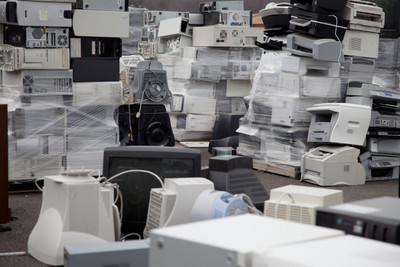What are IT Lifecycle Services?
Dec 17th 2020
The lifecycle of an electronic device begins with acquisition and ends with disposal. On the individual level, this means the purchase of a phone or computer all the way to its inevitable obsolescence. With businesses, this starts with the large-scale procurement of work-specific devices and ends with their eventual disposition. However, not all companies possess the technological expertise it requires to optimize the use of technological assets. Utilizing information technology adeptly, maintaining it, and knowing how to properly dispose of retired hardware requires an additional degree of insight that many businesses do not have. They may employ certain devices for years without ever accessing their full capabilities. They may even spend extortionate amounts of money in acquiring devices that do not fully lend themselves to their needs. Companies that provide IT Lifecycle Services manage every stage of the lifecycle to ensure that the technology used will operate to the peak and specific requirements of their clients.
Acquisition
Even individuals take the time to properly choose an electronic device before purchasing it. Companies, with more specific needs from their hardware, require a much more arduous screening before investing. While devices are available for general use, many benefit specific tasks over others. However, the particular functions of certain devices are not always readily available. Some computers come equipped with Graphic Processing Units (GPUs) that benefit such professions as graphic designers, while desktops are capable of higher, faster processing than almost any laptop.
At this initial stage of the IT lifecycle, companies that provide lifecycle management outline the requirements expected of their clients’ technology assets and help procure accordingly. They act as a singular source to filter the world of IT vendors, maximizing cost efficiency so their clients never overspend on technology they don’t need. Furthermore, they can offer guidance through the acquisition of new technology as the business continues to expand.
Installation
IT Lifecycle Services oversee the entire deployment and installation of business-specific hardware and software. Employing trained technicians to undergo these tasks saves valuable, productive time, ultimately mitigating costs and optimizing use. Utilizing expertise in these fields ensures that the purchased technology will operate exactly as it should. Additionally, they offer training in these fields, equipping their clients with the means to effectively perform technological functions they need to maximize their output.
Maintenance / Warranty
Devices break down. Computers contract viruses. Hardware eventually grows defunct. There is no worse hindrance to productivity than the inability to progress with work at all. Oftentimes, breakdowns are only temporary obstacles, but sometimes it still requires the knowledge of certain experts to overcome these roadblocks. Repairing technology without proficiency can be strenuous and defeating. Occasionally, it can even be costly. A seemingly broken computer could force the acquisition of a new one entirely, when that minor issue might actually have been fixable instead.
Lifecycle management maintains the structural and operational integrity of hardware throughout its lifespan. Technical expertise means that all options to repair a device will be exhausted before resorting to replacement. Even when replacement is the only remaining option, most IT lifecycle services cover the cost of replacement through a warranty. When devices inevitably malfunction, support from informed professionals minimizes the loss of time and resources. In addition, these companies provide upgrades to devices to extend their lifespan and further maximize their efficiency.
IT Asset Disposition
Every electronic device will eventually become obsolete. Simple disposal along with household trash, however, is no longer an option. Aside from legislation prohibiting this in many states, disposing of retired hardware in landfills presents countless environmental hazards. The materials that comprise electronics include poisonous elements like lead and mercury, as well as precious metals such as gold, silver, and palladium. Dioxins have been shown to cause severe dermatitis as well as possible liver damage. E-recycling in recent years has become increasingly important for the sustainability of the global environment. Repurposing potentially harmful components reduces e-waste through reuse in the manufacture of new devices.
Data Destruction is also an integral element of disposal. Improper disposition could lead to security breaches and data compromise, which could result in anything from identity theft to the extortion of intellectual property. Overwriting, degaussing, and physical destruction erase data from retired hard drives and other media to eliminate these risks. Aside from the heavy investments it requires to undergo this stage personally, without the aid of specialized companies there is no way to guarantee that the task has been carried out to completion.
However, proper data erasure and subsequent disposal can only be carried out by certified companies. State and federal regulations mandate certain secure and eco-friendly practices to manage the total disposition of old devices. Certifications from organizations such as the National Association of Information Destruction (NAID) verify compliance with their guidelines, ensuring safe practice. Additionally, institutions such as R2 and E-Steward certify companies that adhere to the strict procedure of proper disposition. The most effective and trustworthy IT Lifecycle Service companies will freely exhibit certifications that confirm compliance with secure Data Destruction as well as responsible disposal.
In addition to these aspects of lifecycle management, services also include scalability. As businesses grow, so do the needs of both their employees and customers. Lifecycle management companies equip their clients with the means to expand without any loss to capabilities. Through streamlining the entire process, offering ongoing support, and guiding future IT investments, IT lifecycle services assume a role of expert guidance. Their assistance can be as large or small scale as their client wants, from overseeing a single step to the entire lifespan. Their level of involvement, too, can be as little as consultation, or as grand as guiding the migration to an entirely new network of platforms. IT lifecycle services provide the necessary knowledge and guidance to ensure that their client’s businesses are always operating at peak efficiency.

